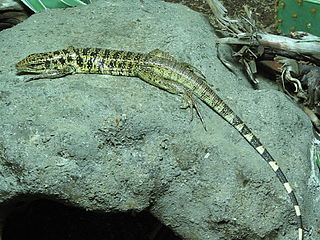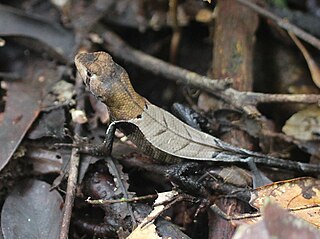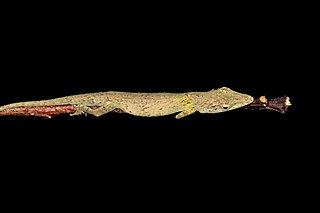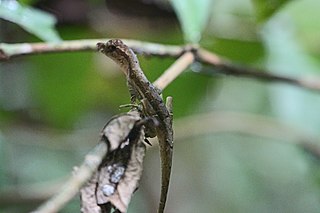
Polychrus is the only extant genus of polychrotid lizards in the world. Commonly called bush anoles, they are found in Central and South America, as well as nearby Trinidad and Tobago.

Tupinambis is a lizard genus which belongs to the family Teiidae and contains eight described species. These large lizards are commonly referred to as tegus. T. merianae, T. rufescens, and T. teguixin are popular in the pet trade. They are primarily found in South America, although T. teguixin also occurs in Panama.

Chironius scurrulus, commonly known as the smooth machete savane, is a large slender colubrid snake. It is also known as Wagler's sipo.

Stenocercus fimbriatus, the western leaf lizard, is a species of lizard in the Tropiduridae family. It is found in the eastern Amazon Basin in Peru, Brazil, and Bolivia.

Stenocercus is a genus of South American lizards, commonly called whorltail iguanas, of the family Tropiduridae. This genus has 80 valid described species.

Polychrus gutturosus, also known as Berthold's bush anole or monkey tailed anole, is a species of lizard found in tropical Central and South America. It is sometimes referred to as a "forest iguana". It lives in forests and jungles from Honduras to Ecuador. It can reach up to 70 cm (2.3 ft) in total length, including its very long tail, and males are considerably smaller than females. This insectivorous lizard is a climbing species that can often be seen holding onto branches. It can even hold on with its hind legs, though it moves slowly that way.

The Puerto Rican twig anole or dwarf anole is a species of small, arboreal anole endemic to Puerto Rico and primarily inhabiting the Cordillera Central from the Sierra de Cayey range in the Southeast to the central-western ranges of Maricao. A mostly grey to olive-brown bodied lizard, A. occultus is the smallest of the Puerto Rican anoles with a snout to vent length of 34–42 mm. In comparison to other twig anoles, A. occultus is extremely cryptic through its unique sleeping behaviors and mottled pattern. Sleeping behavior including site selection minimizes the probability of predator encounter along with A. occultus' extensive list of antipredator behaviors.

Anolis fuscoauratus, commonly known as the slender anole, slender Amazon anole, or brown-eared anole, is a species of lizard in the family Dactyloidae. The species is native to northern South America and Panama.

The Polychrotidae family of iguanian lizards contains the living genus Polychrus and the extinct genus Afairiguana. The family Polychrotidae was once thought to encompass all anoles, including those in the genus Anolis. Studies of the evolutionary relationships of anoles based on molecular information has shown that Polychrus is not closely related to Anolis, but instead closer to Hoplocercidae. It is therefore not part of Dactyloidae and instead is treated as the family, Polychrotidae.

Polychrus acutirostris, the Brazilian bush anole, is a species of lizard native to southern and eastern Brazil, Paraguay, Argentina, and eastern Bolivia. It is diurnal.
Polychrus peruvianus, the Peruvian bush anole, is a species of bush anole native to Peru and Ecuador. It was initially placed in the genus, Polychroides, before being corrected in 1965.

Polychrus marmoratus or many-colored bush anole is a species of bush anole. It is also commonly referred to as the monkey lizard due to its slow movement. The lizard has many predators, including spiders and primates.
Alopoglossus brevifrontalis, Boulenger's largescale lizard, is a species of lizard in the family Alopoglossidae. It is found in Ecuador, Peru, Bolivia, Brazil, Colombia, Venezuela, Guyana, and Suriname.

Anolis ortonii, the bark anole or Orton's anole, is a species of lizard in the family Dactyloidae. The specific name ortonii honors James Orton.

Anolis punctatus, the spotted anole or Amazon green anole, is a species of lizard in the family Dactyloidae. The species is found in Brazil, Venezuela, Guyana, Peru, Ecuador, Colombia, and Bolivia.

Anolis trachyderma, the roughskin anole or common forest anole, is a species of lizard in the family Dactyloidae. The species is found in Colombia, Peru, Brazil, and Ecuador.

Anolis transversalis, the banded tree anole or transverse anole, is a species of lizard in the family Dactyloidae. The species is found in Venezuela, Ecuador, Peru, Colombia, Brazil, and Bolivia.
Polychrus auduboni, or smooth-backed bush anole, common monkey lizard, or many-colored bush anole, is a species of anole native to Venezuela and Trinidad and Tobago. It can be found in forests and shrublands.













